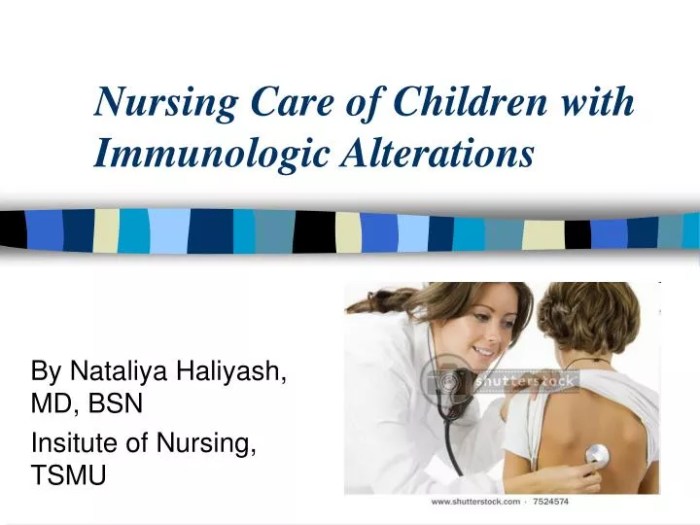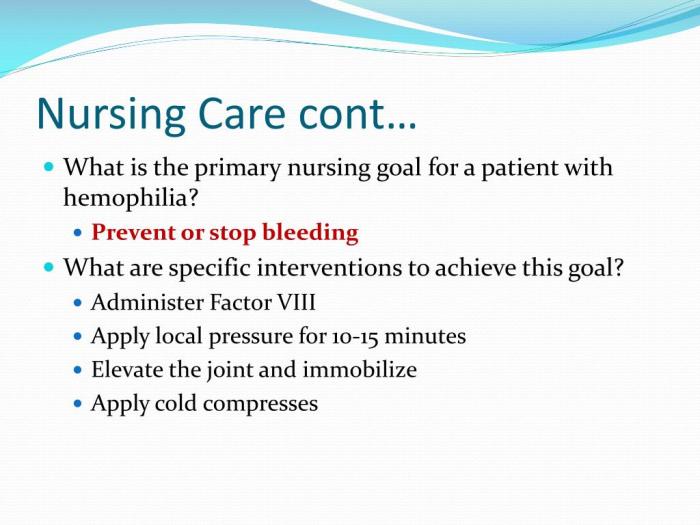Nursing care pediatric hematologic or immunologic alterations – Nursing care for pediatric hematologic or immunologic alterations requires specialized knowledge and a holistic approach to address the unique needs of young patients. This comprehensive guide delves into the common alterations observed in pediatric patients, exploring their pathophysiology, clinical manifestations, diagnostic approaches, and management strategies.
The complexities of hematologic and immunologic alterations in pediatric patients demand a multifaceted understanding of their impact on the developing immune system. Nurses play a pivotal role in providing individualized care plans, monitoring parameters, and patient education to ensure optimal outcomes and empower families in navigating these challenging conditions.
Hematologic Alterations in Pediatric Patients

Pediatric patients may experience a range of hematologic alterations, including anemia, leukemia, and sickle cell disease. These conditions can significantly impact the child’s health and well-being.
Anemia
Anemia is a condition characterized by a deficiency of red blood cells or hemoglobin, resulting in reduced oxygen-carrying capacity of the blood. In children, anemia can be caused by iron deficiency, nutritional deficiencies, chronic diseases, and genetic disorders.
Symptoms of anemia include fatigue, weakness, pale skin, and shortness of breath. Diagnosis is made through a complete blood count (CBC) and iron studies. Treatment depends on the underlying cause and may include iron supplementation, blood transfusions, or medications.
Leukemia
Leukemia is a type of cancer that affects the blood and bone marrow. It is characterized by the uncontrolled production of abnormal white blood cells. Symptoms of leukemia can include fatigue, weight loss, fever, and easy bruising or bleeding.
Diagnosis of leukemia is made through a bone marrow biopsy and blood tests. Treatment options include chemotherapy, radiation therapy, and stem cell transplantation.
Sickle Cell Disease, Nursing care pediatric hematologic or immunologic alterations
Sickle cell disease is a genetic disorder that affects the shape of red blood cells, causing them to become sickle-shaped. These sickle-shaped cells can block blood flow, leading to pain, organ damage, and other complications.
Symptoms of sickle cell disease can include episodes of severe pain (sickle cell crisis), anemia, and infections. Diagnosis is made through a blood test and family history. Treatment includes pain management, blood transfusions, and hydroxyurea.
Immunologic Alterations in Pediatric Patients

Immunologic alterations in pediatric patients can range from mild to severe and may involve both innate and adaptive immunity. These alterations can result in increased susceptibility to infections, autoimmune disorders, and allergic reactions.
Primary Immunodeficiency Disorders
Primary immunodeficiency disorders (PIDs) are genetic disorders that affect the development or function of the immune system. These disorders can result in recurrent infections, autoimmune diseases, and other complications.
Diagnosis of PIDs is made through a combination of clinical history, physical examination, and laboratory tests. Treatment options include immunoglobulin replacement therapy, antibiotics, and stem cell transplantation.
Secondary Immunodeficiency Disorders
Secondary immunodeficiency disorders are acquired conditions that impair the function of the immune system. These disorders can be caused by malnutrition, chronic diseases, medications, and infections.
Treatment of secondary immunodeficiency disorders involves addressing the underlying cause and providing supportive care, such as antibiotics and immunoglobulin replacement therapy.
Allergic Reactions
Allergic reactions occur when the immune system overreacts to a foreign substance (allergen). In children, common allergens include food, pollen, and insect stings.
Symptoms of allergic reactions can range from mild (e.g., skin rash, itchy eyes) to severe (e.g., anaphylaxis). Diagnosis is made through a combination of clinical history, physical examination, and allergy testing.
Nursing Care for Pediatric Patients with Hematologic or Immunologic Alterations
Nursing care for pediatric patients with hematologic or immunologic alterations requires a comprehensive and individualized approach. Nurses play a vital role in assessing, monitoring, and managing these patients’ complex needs.
Nursing interventions may include:
- Administering medications and treatments as prescribed
- Monitoring vital signs and laboratory values
- Providing pain management and symptom relief
- Educating patients and families about their condition and treatment plan
- Providing emotional support and advocacy
Interdisciplinary collaboration is essential to provide holistic care for these patients. Nurses work closely with physicians, social workers, and other healthcare professionals to ensure that all aspects of the patient’s needs are met.
Patient and Family Education

Patient and family education is a crucial component of nursing care for pediatric patients with hematologic or immunologic alterations. Nurses play a vital role in providing clear and concise information about these conditions, their symptoms, and treatment options.
Education should include:
- The causes and symptoms of the condition
- The treatment plan and its potential side effects
- The importance of adhering to the treatment plan
- Follow-up care and monitoring
- Resources for support and information
Empowering patients and families with knowledge and support can help them to cope with the challenges of these conditions and improve their overall well-being.
Case Studies and Best Practices
Case studies and best practices can provide valuable insights into the nursing care of pediatric patients with hematologic or immunologic alterations. These case studies can illustrate the challenges and successes encountered in managing these complex conditions.
Best practices are evidence-based interventions that have been shown to improve patient outcomes. By sharing case studies and best practices, nurses can learn from each other and improve the quality of care provided to these patients.
FAQ Compilation: Nursing Care Pediatric Hematologic Or Immunologic Alterations
What are the common hematologic alterations observed in pediatric patients?
Pediatric hematologic alterations include anemias, leukemias, lymphomas, and coagulation disorders, which can manifest with symptoms such as fatigue, pallor, bleeding, and infections.
How do immunologic alterations impact the immune system in pediatric patients?
Immunologic alterations can weaken the immune system, making children more susceptible to infections, autoimmune disorders, and allergic reactions.
What is the role of nurses in caring for pediatric patients with hematologic or immunologic alterations?
Nurses provide comprehensive care, including monitoring vital signs, administering medications, providing emotional support, and educating patients and families about their condition and treatment.